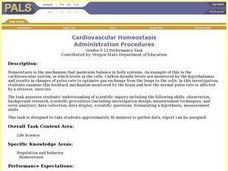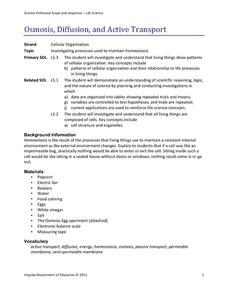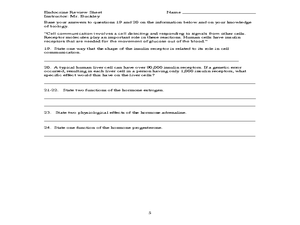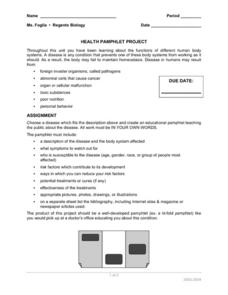Curated OER
Homeostasis
Learners explore homeostasis and identify it in work in an organism. They brainstorm things that stay the same and participate in several demonstrations that illustrate homeostasis. Students predict baseline breathing and jumping jacks
Curated OER
Survival: The Human Body in Extreme Environments
Students create a list of signs the human body gives during threatening weather conditions. They investigate the causes and conditions of dehydration, overheating, and hypothermia.
Coastal Carolina University
Osmosis and Diffusion Lab: Honey I Blew Up the Bear
Beginning biologists explore passive transport through two demonstrations and a hands-on inquiry. Spray air freshener from one spot in the classroom and have class members raise their hands as the scent reaches them. Also, place a teabag...
Curated OER
Anatomy of the Heart
Tenth graders examine the different parts of the heart. In this biology lesson, 10th graders perform dissection of the fetal pig. They explain how the heart maintains homeostasis.
University of Minnesota
Mirroring Emotions
Do you ever give your class the "teacher look"? Without saying a word, they become silent and engaged (hopefully). How do they know what you're thinking? Explore the concept of nonverbal communication and how it relates to our mirror...
Virginia Department of Education
Thermochemistry: Heat and Chemical Changes
What makes particles attract? Here, learners engage in multiple activities that fully describe colligative properties and allow the ability to critically assess the importance of these properties in daily life. Young chemists conduct...
Curated OER
Organ System Interactions
Eighth graders who have studied all of the organ systems now discover how they all are related and work together in the human body. They discuss a variety of situations in which more than one system plays a part. They identify the...
Serendip
Should You Drink Sports Drinks? When? Why?
New research proves even rinsing your mouth with carbohydrates without swallowing improves performance of the central nervous system. While some think sports drinks are amazing, others say they are a waste of money. Scholars learn about...
Curated OER
The Urinary System
In this urinary system activity, students review the role the kidneys and nephrons play in the formation of urine. Students order the steps of the filtration of blood. This activity has 3 short answer and 10 fill in the blank questions.
Curated OER
Wilderness Survival: A Field Practicum
Students use hands-on field-testing of authentic application from principles pertaining to: Psychology- A. Develop a positive, can-do attitude with a high degree of self-reliance that is transferable to human interactions outside of the...
Curated OER
Standard 4 Review Sheet-Key Ideas Biology-The Living Environment
In this living environment worksheet, high schoolers answer a variety of questions about living organisms, the processes they go through to make food and break down food, absorb nutrients, and release toxins. They explain homeostasis,...
Curated OER
Stay Well
Students complete a three part activity lesson to identify elements of longevity in life expectancies and health. In this life expectancies lesson, students read background information about life expectancy data, and visit links to for...
Curated OER
Cardiovascular Homeostasis
High schoolers develop and conduct an experiment to answer the question," How does cardiovascular exercise affect the pulse rate?". They record the changes to heart rate during different levels of exercise.
Nuffield Foundation
Intrepreting Information about Sweating and Temperature
Why do we sweat? Scholars analyze data about body temperature, sweating, and other factors to better understand sweating. They note the changes after drinking ice water to sweating, skin temperature, and body temperature. Analysis...
Virginia Department of Education
Osmosis, Diffusion, and Active Transport
No, it really is okay to play with your food! Emerging scientists manipulate popcorn, eggs, and other household objects as they demonstrate multiple cellular processes. The activity, capable of modifications, is designed to reflect the...
Perkins School for the Blind
Human Body Regulation
The human body can regulate itself through sweating and resting. Learners with visual impairments discuss how the body changes when it is under stress and what it does to regulate itself. To start, kids use talking thermometers to take...
University of Minnesota
What's the Deal? Addiction Card Game
Addiction is a big deal! Playing a game of cards helps learners understand the concept of addiction. Through their analysis, they examine the potential for addiction and how it varies for each individual.
University of Minnesota
Dendritic Spines Lab
This is your brain on drugs ... literally! Your neuroscientists-in-training examine the evidence of drug use on the human brain and how neurons change their connectivity when altered by drugs. They then work together to create testing...
University of Minnesota
Neurotransmission Model
Don't lose your marbles — you'll need them for a lesson on neurotransmission. Young scholars build a neurotransmission model using marbles, beads, rubber bands, string, and other elements. After studying specific neurotransmitters,...
Curated OER
Organ Systems
Young scholars examine organisms that are composed of tissues, organs, and systems. They dissect a fetal pig and explore the assigned organs systems such as the skeletal, muscular, and circulatory organs. Students identify and explain...
Curated OER
Endocrine Review Sheet
Starting with a diagram of the kidneys and urinary tract of the human, this sheet has questions about excretion, blood concentrations of hormones, gland feedback mechanisms and the effects of some hormones.
Explore Biology
Health Pamphlet Project
Biology or health nuts select a disease to research and produce a pamphlet that can be used to inform the public. The tri-fold product is worth 100 points according to the included grading page.
University of Minnesota
Virtual Neurons
It's electric! Young anatomists use Virtual Neurons software to build, control, and analyze complex nerve circuits within the body. Colorful and packed with content, class members enjoy interacting with the nervous system at a personal...
University of Minnesota
Sheep Brain Dissection
Bored with frog and earthworm dissections? Had your fill of fetal pigs? Anatomy students will be intrigued by the sheep's brain, and you will be prepared with guiding questions, extension activities, and pictures as they dissect one —...

























